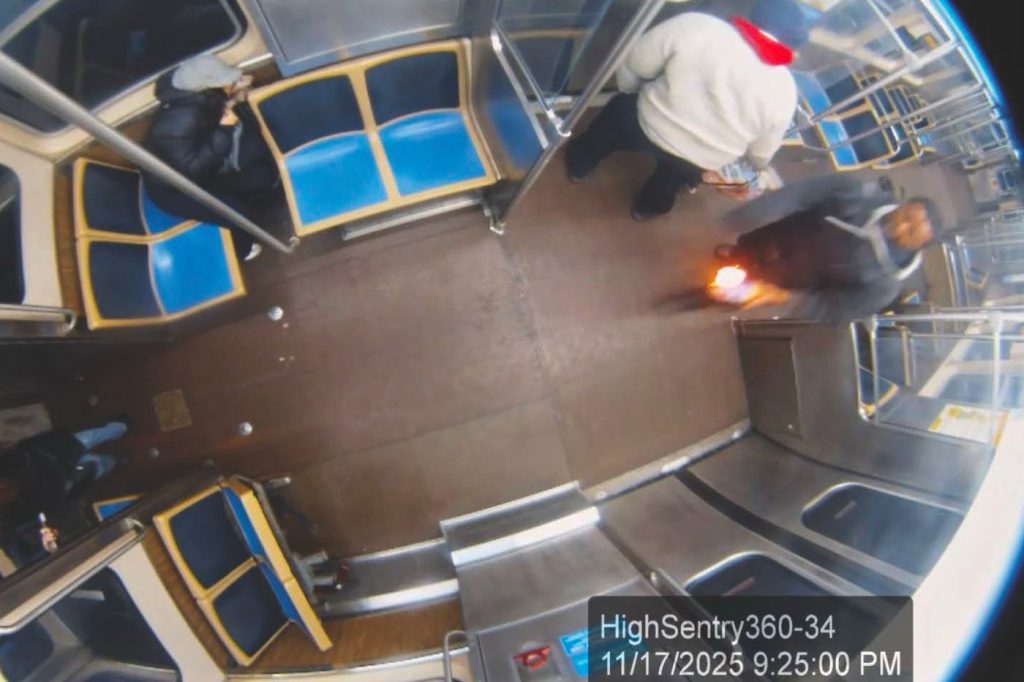On Wednesday, federal prosecutors charged Lawrence Reed, a 50-year-old man from Chicago, with committing a terrorist attack on a train. This accusation stems from an incident that occurred on Monday night, when Reed allegedly poured gasoline on a 26-year-old woman and attempted to set her on fire inside a Blue Line L train car in Chicago. According to an affidavit from the Bureau of Alcohol, Tobacco, Firearms and Explosives, Reed was sitting at the back of the car when he approached the woman and doused her with gasoline from a plastic bottle.
Following the initial attack, the woman fought back against Reed's attempts to ignite the gasoline. In the ensuing chaos, she fled from one end of the train car to the other, with Reed in pursuit. Surveillance footage reviewed by investigators reveals that Reed eventually ignited the gasoline and approached the woman, setting her ablaze. The attack left the victim with severe burns, and she was subsequently transported to a hospital in critical condition. Authorities have not released her identity.
The federal charge against Reed carries a maximum penalty of life imprisonment. Notably, during his initial federal court appearance on Wednesday, Reed exhibited disruptive behavior, shouting that he wanted to represent himself and claiming to be a Chinese citizen. He repeatedly declared, “I plead guilty!” despite the judge’s attempts to guide him regarding his legal rights.
Further investigation revealed that approximately 30 minutes prior to the attack, Reed was captured on surveillance video filling a container with gasoline at a gas station. After the attack, he exited the train and walked away from the scene as the victim stumbled out and fell to the ground. Reed was arrested by Chicago police the following morning and, according to the affidavit, made incriminating statements regarding the incident while wearing the same clothing as the attacker and having burns on his right hand.
Authorities assert that Reed carried out the attack—"with the intent to cause death and serious bodily injury to one or more persons"—based on the ATF investigator's statement in the affidavit. Additionally, the Chicago police did not provide details on whether they would refer the case to state prosecutors, indicating that inquiries should be directed to federal authorities.
During a news conference after Reed's court appearance, federal officials expressed their frustration over Reed’s status as a free man at the time of the incident, citing his lengthy criminal history. ATF Special Agent-in-Charge Christopher Amon emphasized that Reed "had no business being on the streets" given his past violent behavior and ongoing criminal cases, which culminated in an innocent victim now fighting for her life.
U.S. Attorney Andrew Boutros noted that if the victim were to succumb to her injuries, the case might be eligible for the death penalty. However, it is important to note that Illinois abolished the death penalty in 2011. When questioned about Reed's mental health, Boutros stated he had no knowledge of Reed ever being legally declared mentally incompetent.
Additional details about Reed’s criminal history are expected to be disclosed during a detention hearing scheduled for Friday. The assault has drawn comparisons to a recent stabbing incident on a commuter train in Charlotte, North Carolina, where a young woman was killed. Federal authorities have charged a suspect in that case as well. Both incidents have prompted criticism of urban areas, particularly by former President Donald Trump, who has labeled Democratic-led cities as crime-ridden despite overall declines in violent crime since the pandemic-era spike.
U.S. Transportation Secretary Sean Duffy highlighted the Chicago train attack in a social media post, emphasizing the need for communities to prioritize safety to prevent similar occurrences. The Chicago Transit Authority has stated that it is cooperating with law enforcement in the investigation and is implementing a multifaceted security strategy that includes the use of surveillance cameras.












